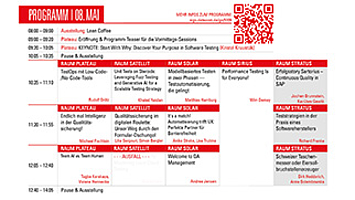Die im Konferenzprogramm des GTD 2024 angegebenen Uhrzeiten entsprechen der Central European Time (CET).
Ihr benötigt mehr Übersicht vor Ort?
» Zur Programmübersicht als PDF (Mittwoch)
» Zum Raum- und Expoplan
Konferenzprogramm 2024
Thema: AI
- Mittwoch
08.05.
Building secure and reliable software is an essential and challenging endeavor that requires extensive testing. Due to development teams' time and resource constraints, testing falls short, and necessary tests are even skipped altogether. Feedback-based fuzzing is the most practical dynamic testing method to find bugs and security vulnerabilities in software. In this talk, I'll provide an overview of fuzzing and show how we can leverage large language models to generate the test harnesses needed…
Was wäre, wenn wir heute schon menschliche Intelligenz in der Qualitätssicherung und im Testdesign nutzen würden? Oft zeigt sich, dass noch viel zu viel aus dem Bauch und ad hoc durchgeführt wird. Da hilft es dann auch nichts, diese Ergebnisse aus dem Testdesign zu automatisieren. Können uns Sprachmodelle wie ChatCPT helfen. Wie? Auf was müssen wir achten? All diese Punkte werde ich in meinem Vortag beleuchten und mit Live-Beispielen untermalen. Der Vortrag wird durch ein Miro-Projekt…
When we explain our neurodivergent brains and how they work to colleagues and friends, we often get compared with Artificial Intelligence - no joke! But one of us is barely using AI tools and one of us loves them! We will play a game with the audience to finally know if you are Team Human or Team AI. In addition, we will share with you our assessment approach to help you determine if you have any weaknesses that ChatGPT can help you with. You will know if you are the type to use the tool and…


